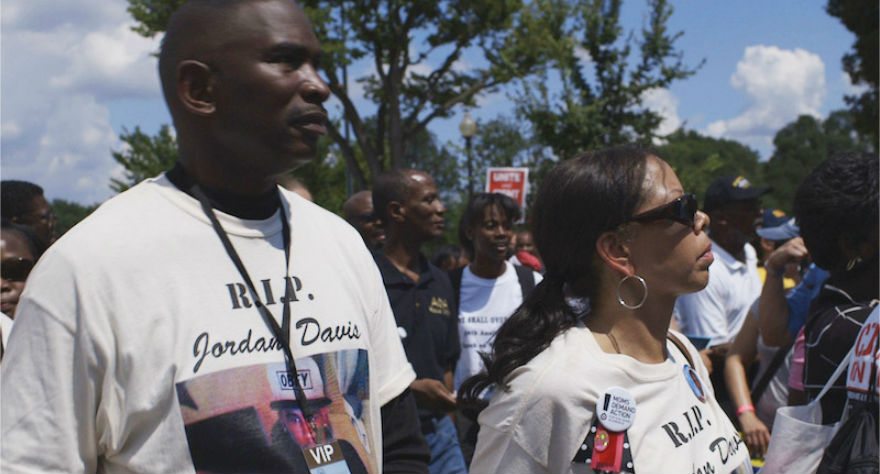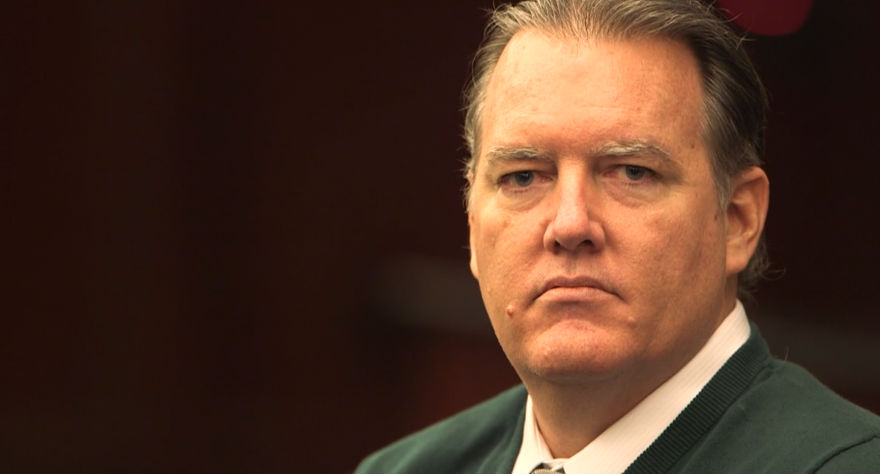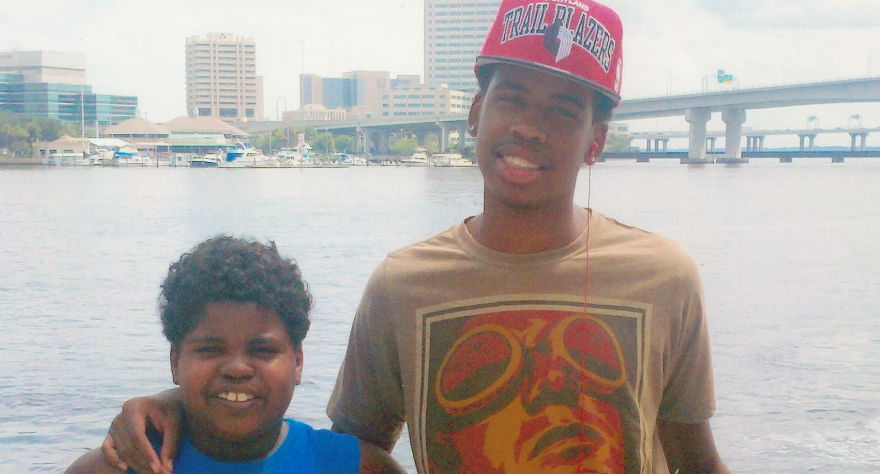Lucia McBath On How Understanding Her Son’s Death Can Help Heal the Country

3 1/2 Minutes, 10 Bullets is a courtroom documentary revolving around the 2012 Florida gas station shooting and murder of black teen Jordan Davis by Michael Dunn, a middle-aged white man. Citing “loud music” as the inciting factor in the crime, Dunn fired ten bullets at Davis and his unarmed friends as they fled the scene. Director Marc Silver takes a bracingly minimalist approach to the trial, presenting the unfolding case unadorned, allowing the story to speak for itself.
I spoke to Jordan’s mother, Lucia McBath, about working with Silver, what we can learn from her son’s death, passing on the values of the civil rights movement to younger generations and much more. 3 1/2 Minutes, 10 Bullets opens this week in limited release and will air on HBO in the fall.

I wanted to get your reaction to something I saw recently. When asked about the recent string of unarmed black teens being killed by police officers, Neil Degrasse Tyson said, “Okay, this is really bad. But in a way, we’re making progress. When I was a kid growing up in the Bronx, stuff like this happened all the time. Back then, it wouldn’t even make the local paper. Now, it’s national news.”
I agree, absolutely. These kinds of crimes have been happening in communities of color all along. It’s nothing new to us. But now it’s really being exposed. This is just not acceptable. What happens in our communities affects all communities. We’re all an extension of one another. How can we, as a nation of people under the premise of God, condone what we see happening and not make it our business to make change?
I think it’s an issue of education. A lot of people aren’t educated and cultured enough to treat others with real empathy.
Absolutely. We’re always afraid of what doesn’t look, act or think like us. We’re such a diverse country, and that’s what makes us great. But when you have individuals in this country that are afraid of that or believe they’re losing control, they will use any means necessary—systemically, civically, educationally, legally—to try to stymy the growth of our nation and perpetuate fear. When you start telling people they’re not worthy, you’ll see an uprising. I don’t agree with violence and destruction, but it’s just a result of a need.
I think what this film does that’s so important is remind us that Jordan was a human being, a person with interests and hobbies and friends and family. Sometimes it feels like Trayvon Martin is a stereotypical thug to some people, and almost a mascot martyr to others.
We wanted to make sure that people knew who Jordan was. That was the tragedy of Trayvon’s case, that no one ever got to know who he was. He was demonized from the beginning. We were not going to let that happen with Jordan. We were going to tell the truth. We wouldn’t let the media decide for themselves who Jordan was. We’re doing that for his friends, too. Jordan wasn’t hanging out with a bunch of bad kids or doing anything wrong. They came from two-parent households and were all in college. It’s a matter of changing people’s perceptions of the young black male.
What struck me about Dunn’s case was that it almost felt like a generational thing. He said things like “gansta rap,” which is a pretty antiquated term these days. He’s from a generation that still harbors a racist philosophy.
He had all those hours and days sitting there to think up this stuff. “Rap crap.” That was all stuff he created. When people are not exposed to others who look and act differently then them and isolate themselves, this is who they become. This is what they think. If we can help your generation to dispel those kinds of biases, then we’re on the right road. I’m a civil rights baby and my parents were civil rights leaders. I’ve seen that mindset; there are a lot of people in this country who have not. I also think my generation has neglected to give our children knowledge about civil rights. It wasn’t just for black people, but for all people of color. Our generation made it comfortable for you to live in the result of all that hard work, but we didn’t teach you those values. I admire the Jewish community so much. Out of the Holocaust they have risen. They are strong, highly educated people who decided that they’d never forget their past and wouldn’t let their children forget their past.
As a person of color I have to grapple with this reality of being looked at as different every day. I have to go out of my way to accept people even when they say uncomfortable things about me. I have to be the bigger person. I think about this every day, but white people don’t have to think about this, ever. They don’t have to. Some of them do, and I think that’s wonderful and considerate.
But it’s not a part of their existence. They don’t have to think about it.
How do we get them to think about it?
[Sighs] I actually end up doing that a great deal. The easiest way, for me, is to share an example of my life. Anything that I might be able to get them to relate to. If I can share an instance of what I’ve experienced as a black woman and the way’s I’ve been looked upon—even as a fair-skinned black woman—I can hopefully get through.
Talk about meeting Marc for the first time.
He’s kind of a shy person. I was feeling him out. My first thought was, “Okay, he’s a Brit. What does he know about gun violence in this country?” But I understood very quickly that he’s very intuitive with the human spirit and addressing issues of racism. I thought it was refreshing, him being from outside the United States and being able to see what was happening in our country with race and guns and violence. He just has compassion for the human experience, and I so admire him. During the trial we’d have little dinner parties, and he’d come and just be normal with us. He’d allow us to be normal as well—cry when we needed to, get angry when we needed to and not be filmed.

The most startling moment of the movie is when Rhonda tells the truth on the witness stand and basically blows out Michael’s case. What was going through your mind as you sat there?
From the very beginning, my question to the attorneys and detectives was, “Why are we not prosecuting her? She was accessory to the crime!” She told Michael to take her home, not call the police. In my mind, she was just as guilty. I was being told the whole time not to worry about it, because she was cooperating. I didn’t believe she would tell the truth. I had serious doubts. So when she got on the stand and told the truth, it was like an elephant coming off of my chest. She was the one person who could dispel the lies. I don’t know what compelled her to do it other than that she didn’t want to go to jail too. When people ask if I give her sympathy…[trails off]. Thank you for doing the right thing. But for me, that’s as much as I can give.
As an audience member, I was absolutely flipping out watching some of those courtroom scenes. How did you stay so calm?
We were told by the judge that we couldn’t show any emotion. Michael Dunn had more rights in that courtroom than we did. He was allowed to show pictures with his family, but yet, we weren’t even allowed to call Jordan “the victim.” Everything was done to make sure the jurors didn’t sympathize with us. We were told not to sit in the front row. As Michael Dunn is up there on the stand, lying, we had to just sit there. When you see me and Jordan’s father looking down, it’s because that burden was so heavy.
Tell me about the conversations you’ve been having with people at screenings and Q&As.
What we have been hearing and seeing has been so encouraging. A lot of people don’t really know about the case, but of those that do, they don’t know the intricacies of what happened and what brought us to the trial. For them to be able to see these biases that existed going in, it forces them to look into their own hearts and say, “Is there anything about that story that resembles how I feel?” If we can do that, we’ve done well. We just want to open up the conversations.
